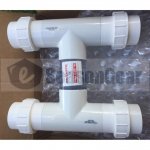- Jul 17, 2010
- 13
- Pool Size
- 27500
- Surface
- Plaster
- Chlorine
- Salt Water Generator
- SWG Type
- Jandy Aquapure 1400
So the question I have is this is a brand new pool setup and the plumbers who came out to hook up my equipment placed a check valve in this location as shown in the picture. The plumber told me that they need to do this because heat pumps would have too much pressure going to them if the PVC line went right from the filter outlet to the heater inlet. It would put too much pressure in the heater lines and cause damage. They said they only do this with heat pumps on all there installs and not other type of heaters. Does this seem right to you guys? I'm thinking that I'm not going to get the most from my heat pump because some of the water will be able to bypass the heater essentially. Thoughts?
Equipment: 2 HP Jandy Pro pump, Jandy Filter Cartridge CL460, AquaCal SQL 175 heat pump, Jandy PLC1400 SWG
Equipment: 2 HP Jandy Pro pump, Jandy Filter Cartridge CL460, AquaCal SQL 175 heat pump, Jandy PLC1400 SWG


![IMG_0537[1].jpg](/data/attachments/54/54320-04098de43ca4f9418422943f36fcc053.jpg)
![IMG_0536[1].jpg](/data/attachments/54/54321-f7605de637ed54ea88edf9d2f5bded63.jpg)
![IMG_0539[1].jpg](/data/attachments/54/54327-5051a9f27574d496e88d8db27c54b4ec.jpg)
